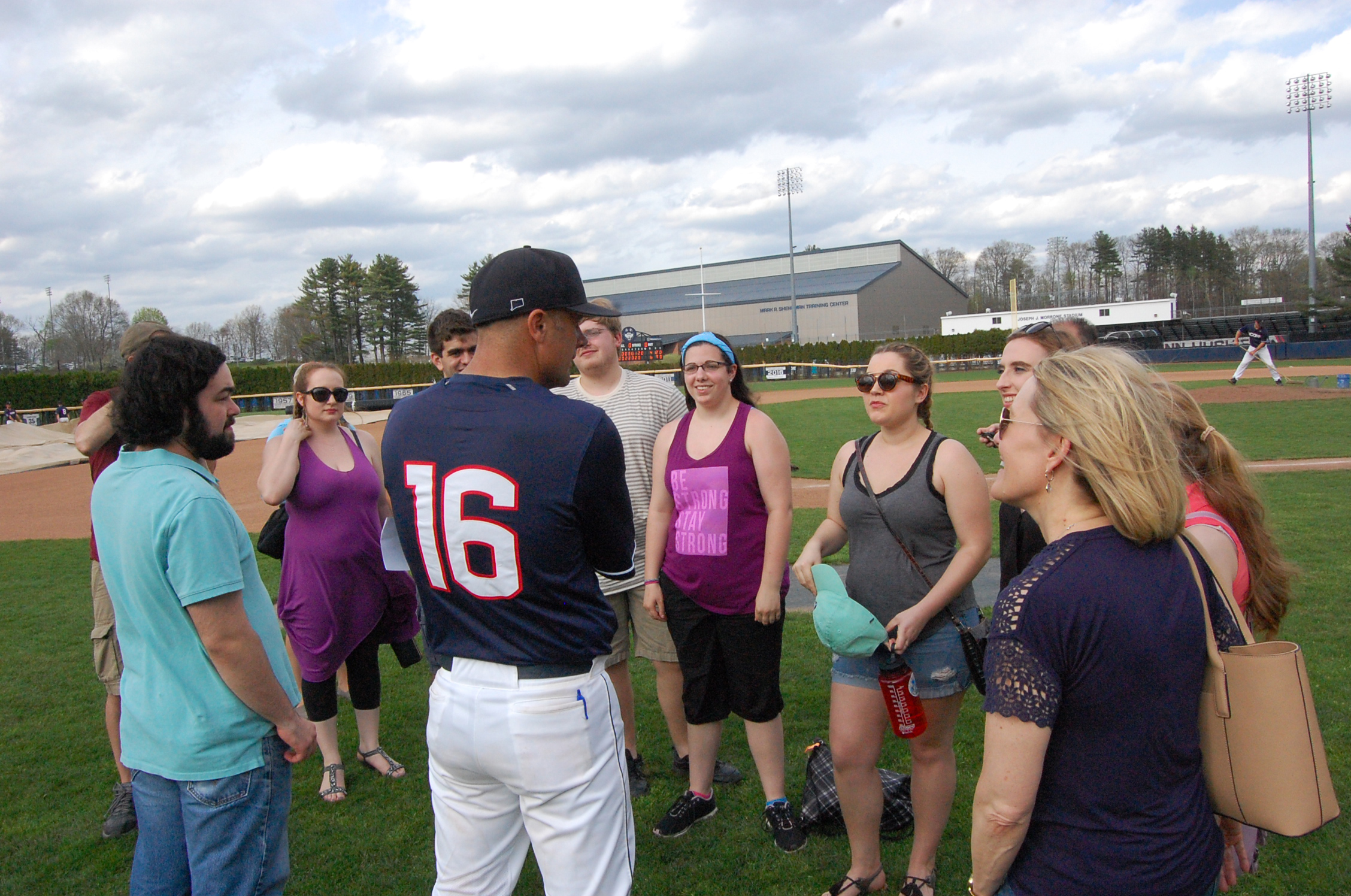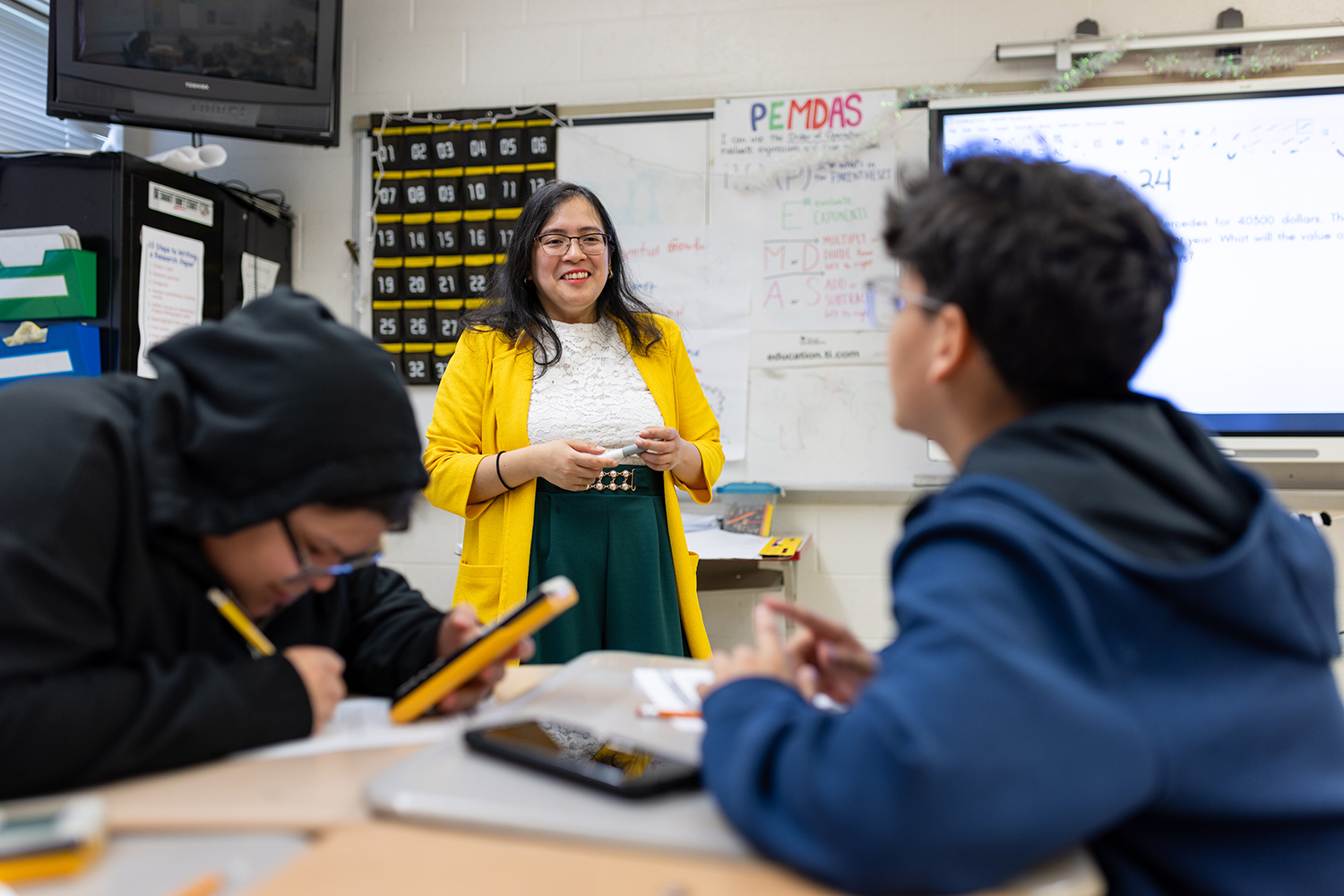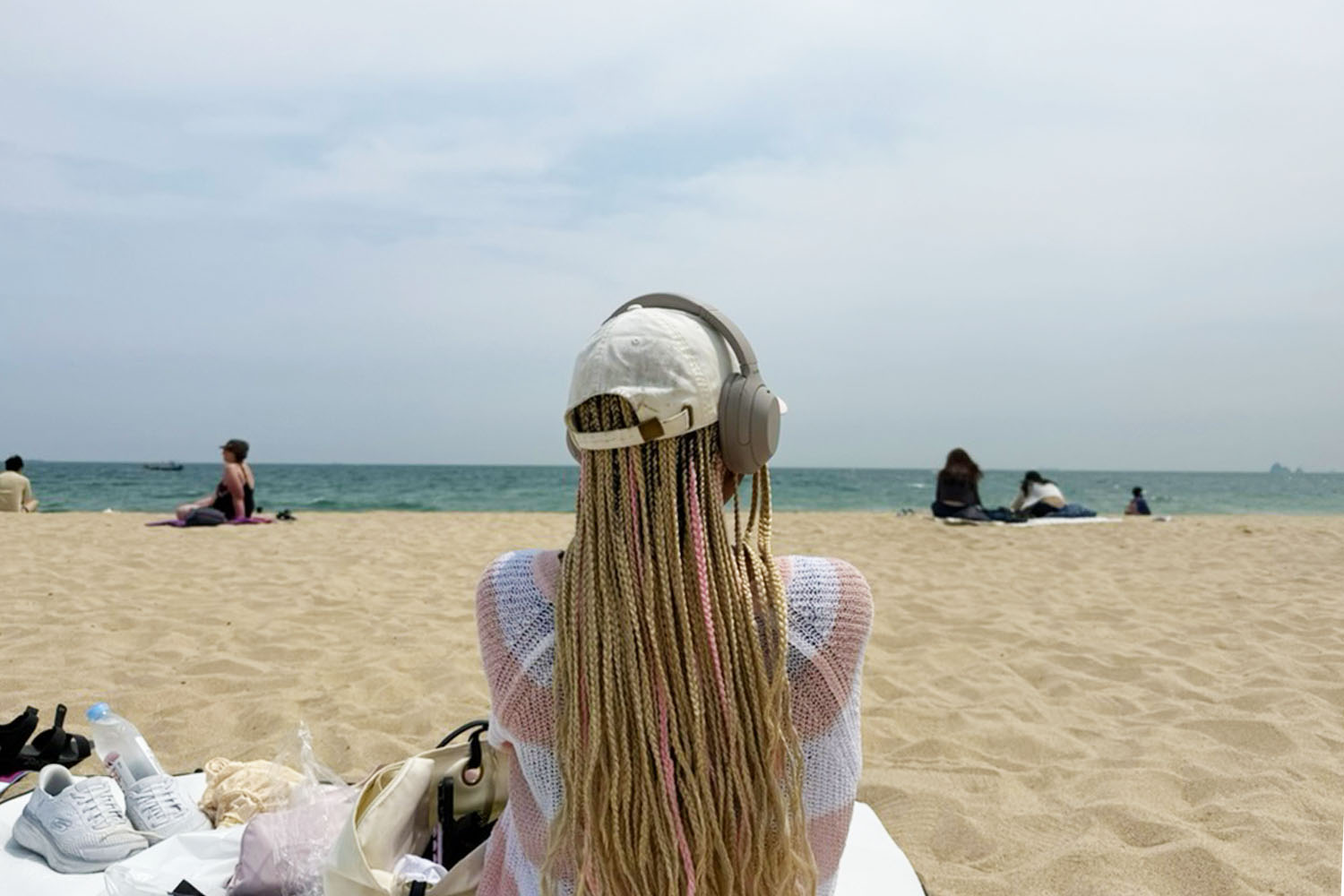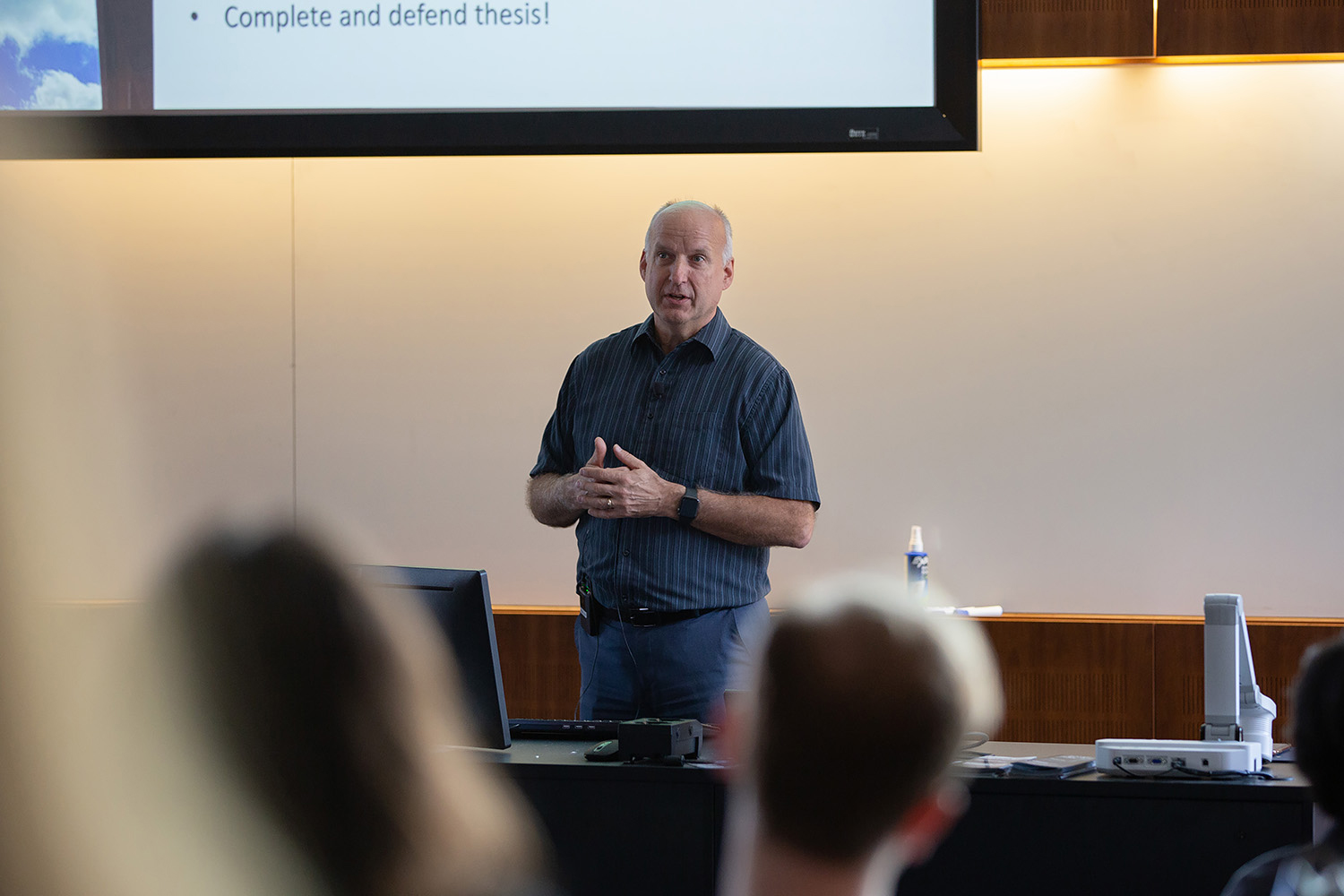
As the members of the Huskies baseball team walked into the room to have dinner with music students rehearsing the Gilbert & Sullivan comic opera “H.M.S. Pinafore,” Anne D’Alleva recalls feeling like a nervous party host.
“I was petrified they wouldn’t talk to each other,” says the dean of the School of Fine Arts. “But as soon as the students came in and sat down, they started talking about their studies, their work, their sports, their singing. It was wonderful to get them together.”
The more than 30 members of the baseball team gathered with the 27 undergraduate and graduate music majors to discuss what D’Alleva felt would be their shared experiences as members of their respective ensembles. After that dinner back in January, the student-athletes enjoyed a private dress rehearsal performance of the opera at the Jorgensen Center for Performing Arts, and the musicians were invited to a baseball game at J.O. Christian Field, which occurred on April 30.
They call it rehearsal, we call it practice. … I think there’s a lot more similarities than differences. — Coach Penders
D’Alleva says the “Arts and Athletics” program pairing the baseball team with an opera company was designed to allow students to compare notes on teamwork, where each member has the responsibility to perform well so the entire group can be successful in their performances either on stage or on the field of play. Head baseball coach Jim Penders ’94 (CLAS), ’98 MA says he welcomed the opportunity for his team to participate.
“They call it rehearsal; we call it practice,” Penders says. “You’re breaking down small parts and trying to get an ensemble to work together in some way, shape, or form. Baseball is very much like that. You’re alone on stage sometimes in the opera and then you’ve got a cast to deal with. In baseball, you’re alone in the batter’s box, sometimes very alone on the [pitcher’s] mound, but it’s a team game. I think there’s a lot more similarities than differences.”
The student athletes and musicians say they quickly found common ground in comparing how they each prepare for their activities on the field or on the stage.

“We watched them practice and they’d mess up. If they did, they’d stop and do it again because of one person,” says outfielder Keith Krueger ’17 (CAHNR), a resources economics major, recalling his observations watching rehearsal. “It’s the same thing in practice for us; one person messes up, we’d have to redo the whole thing, fix it, and then do it again. I thought it was really interesting.”
Adds Grace Carver ’18 (SFA), a music education major, while watching the Huskies defeat Cincinnati in Storrs on a warm Saturday afternoon recently, “I’m noticing today watching the game that there’s a sense of family, just like we have a huge sense of family. We’ve got each other’s backs. As their teammate is up at bat, they have things they do to cheer on that specific team member. We have connections with our cast members or singers. They obviously have that connection during and outside of the game. That’s cool to watch.”
Constance Rock, associate professor of music and coordinator of applied vocal studies who heads UConn Opera, says she also found similarities in how coaches and faculty work with their students. In both instances, they work closely with students as they develop their talents, guide them through difficult times, and prepare them for performances and competition.
“We feel so invested in them, and expect discipline and certain behavior,” Rock says. “We have to nurture them and have engagement with them from freshman through senior year and, really, through a lifetime. You mentor them in every way. It’s different than other professors. It feels like they’re your kids. When I spoke with the coaches, I feel we have that in common.”
… we [music majors] have a huge sense of family. We’ve got each other’s backs. As their teammate is up at bat, they have things they do to cheer on that specific team member. — Grace Carver
The relationship between performing artists and athletes has evolved into the focus of study recent years, particularly with research and comparisons to approaches in performance psychology and injury prevention and treatment. The website Athletes and the Arts focuses on collaborative exchange between sport athletes and the musician/performing artist communities. The website notes commonalities such as daily practice or competition, performing at various times of day, competing in challenging environments and little time to enjoy an “off-season.”
Former New York Yankees centerfielder Bernie Williams, a five-time All-Star who was part of four World Series championship teams, is also a classically trained guitarist who now is a full-time performing musician. In a 2011 interview with Jeff Eisenband of ThePostGame.com, he spoke about the complementary relationship between music and baseball: “I was able to draw a parallel between the things that I’ve been able to utilize in music that have helped me in baseball and now, things that I’ve utilized in baseball that are helping me, now, performing on stage.”

Following its win over Cincinnati, the baseball team fulfilled its post-game obligation to roll out the tarp to cover the infield for protection against the elements, aided by some of the opera students. Music major Scotty Duval ’18 (SFA) noted that there are similar requirements for performance artists to take down the sets and clean up the stage before leaving rehearsal. He adds that both groups of students share a constant struggle against the clock and balancing their responsibilities.
“Performers, musicians, we’re so busy with performances, recitals, juries, concerts,” Duval says. “The baseball team is very busy. They travel all the time, they practice; we don’t have a lot of opportunities to go support each other’s programs. I haven’t been to a baseball game in a while. I forgot how much fun it is to watch and have the camaraderie of rooting for the same team. I think this program was a good opportunity bring us together.”
Penders says that in addressing his team and the music students in January, he suggested bringing students with varied interests together should be a more regular occurrence throughout the campus.
“The Huskies do a great job off campus of serving in the community whenever we can when we’re not in practice or in games We don’t do a good enough job on campus supporting each other,” he says. “I’ve always said a shortstop can learn a lot more from the music major that lives down the hall in his dormitory than he can from the outside linebacker. The more often we get those groups together, the better off we’re all going to be in the future. I think that’s the key.”
That is what D’Alleva has in mind. She hopes to establish additional relationships with other Huskies coaches and their teams to meet with other School of Fine Arts students and faculty.
“Ideally we would work with different teams and different groups of performing and visual arts students and get them together for dinners and lunches and each other’s events,” she says. “To me this about celebrating these students who give so much to the University and the community, and enabling them to connect and support each other.”
Watch this video: UConn Arts & Athletics : Opera and Baseball.



